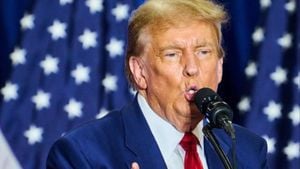After what many are calling one of the most intense and closely watched elections, Donald Trump has reclaimed the title of U.S. President, winning against Kamala Harris and marking his return to the White House after four years. Among the first to reach out was Turkish President Recep Tayyip Erdoğan, who warmly congratulated Trump for what he described as his "magnificent victory."
On his social media account, Erdoğan expressed hope for stronger Turkish-U.S. relations moving forward. "I hope Turkey-U.S. relations will strengthen, and regional and global crises, particularly the Palestinian issue and the Russia-Ukraine war, will see resolutions," he wrote. This statement highlights Erdoğan's optimistic vision for future ties, which he believes could facilitate peace and cooperation on significant international issues.
The ramifications of Trump’s victory extend well beyond U.S. borders, particularly for Türkiye, which has experienced fluctuated relations with Washington under previous administrations. Observers note the palpable excitement within Ankara, as Trump and Erdoğan previously established what many viewed as a pragmatic rapport during Trump’s first term. The two leaders often communicated directly, which, according to many analysts, could pave the way for improved bilateral interactions.
Reflecting on the previous administration, the Biden presidency was marked by visible tension and unmet expectations between Ankara and Washington. Many Turkish officials felt disappointed by Biden’s reluctance to address bilateral issues substantively, particularly relating to defense and security. The Ukraine-Russia conflict and the humanitarian crisis exacerbated by prolonged military actions against Palestinians appeared to frustrate Turkish officials, who were seeking more engagement from the U.S.
With Trump back at the helm, questions loom about how this will reshape the U.S.-Türkiye dynamic. Trump’s approach, which once maintained open lines of communication with Erdoğan, could be pivotal. Erdoğan's remarks indicate hopes for constructive dialogue as Türkiye contends with complex challenges ranging from the Syrian conflicts to NATO obligations and the struggle for peace in the Middle East.
Erdoğan praised the Turkish people and expressed belief during somber moments of conflict, emphasizing the necessity of global collaboration. He noted the need for concerted efforts to establish fairness and justice internationally, encouraging cooperation among friendly nations. "I believe more efforts will be made for a fairer world," he stated, articulally echoing sentiments shared by leaders around the globe who now view Trump’s presidency as synonymous with unpredictability yet also opportunity.
Global leaders from various nations have similarly reached out to congratulate Trump, expressing their aspirations for future collaborations. NATO Secretary General Mark Rutte underscored the importance of Trump's leadership for the alliance, reinforcing the need for collective strength. "His leadership will again be key to keeping our Alliance strong," Rutte stated, highlighting the significance of transatlantic ties.
European Union chief Ursula von der Leyen similarly conveyed enthusiasm for Trump’s return, stating, "The EU and the U.S. are more than just allies; we are bound by a true partnership between our people," which echoes earlier sentiments of mutual respect and collaboration witnessed during Trump’s first term.
Even Ukraine's President Volodymyr Zelensky spoke of hopes for improved conditions under Trump's leadership, indicating expectations for efforts toward achieving peace. Zelensky noted, "I appreciate President Trump's commitment to the 'peace through strength' approach," hinting at his belief this might bring justice closer amid conflict.
While the atmosphere appears optimistic, tensions remain beneath the surface, particularly with tensions involving Israel and its treatment of Palestinians, which are of grave concern to Erdoğan and many Turks. During the previous Trump administration, certain policies were more favorable to Israel, raising questions about how the new term will address the Israeli-Palestinian conflict. Erdoğan’s call for resolution indicates Türkiye's readiness to potentially navigate this complex dynamic to align with U.S. policy.
Despite the positivity surrounding Trump’s victory, analysts urge caution. The geopolitical climate remains fraught, with conflicts still simmering across various fronts, and it's unclear how Trump's administration will handle such intricacies. Questions abound about whether Trump will revert to his transactional style or adopt new strategies, considering the hitherto unresolved issues span from security strategies and defense trade to U.S. support for groups within the region.
Trump’s previous administration played host to direct communications and several attempts to resolve long-standing issues, particularly during his earlier tenure. Still, regional development dynamics could lead to new complications. Should Trump proceed with actions pertaining to troop withdrawals or military engagements, such moves may cultivate closer relations between Türkiye and Washington; yet comprehensive policy changes remain to be seen.
Erdoğan's congratulatory message and optimistic view of relations offer insight not only about Türkiye’s aspirations but also reflect broader sentiments from various observers who see Trump's administration as potentially transformative for international diplomacy, especially concerning crisis management and security topics cloaked by uncertainty.
While Erdoğan and other international leaders extend their appropriate congratulations, the coming months promise significant involvement by Trump as he navigates the tumultuous international waters and seeks to engage allies. The promise of cooperation and collaborative resolution to regional tensions will undeniably rest largely upon the set priorities within Trump’s administration, shaping future Turkish-American relations.
On the broader scale, as the world watches, the dynamic between Trump and Erdoğan could redefine modern diplomacy and influence how various conflicts—past and present—are addressed. With hopes for improved conversations, the post-election reactions showcase the optimism intertwined with pragmatic realism important for future state partnerships.



